Understanding Marriage for Autistic Individuals
Marriage among autistic individuals is often misunderstood and surrounded by myths. While the societal marriage rate is significantly lower for autistic adults compared to neurotypical populations, the possibility, reality, and richness of relationships for autistic people are profound and deserving of recognition. This article delves into the complex yet inspiring world of marriage for autistic individuals, exploring statistical insights, personal stories, emotions, and the legal and social frameworks that influence their experiences.
Marriage Rates and Demographics among Autistic Adults
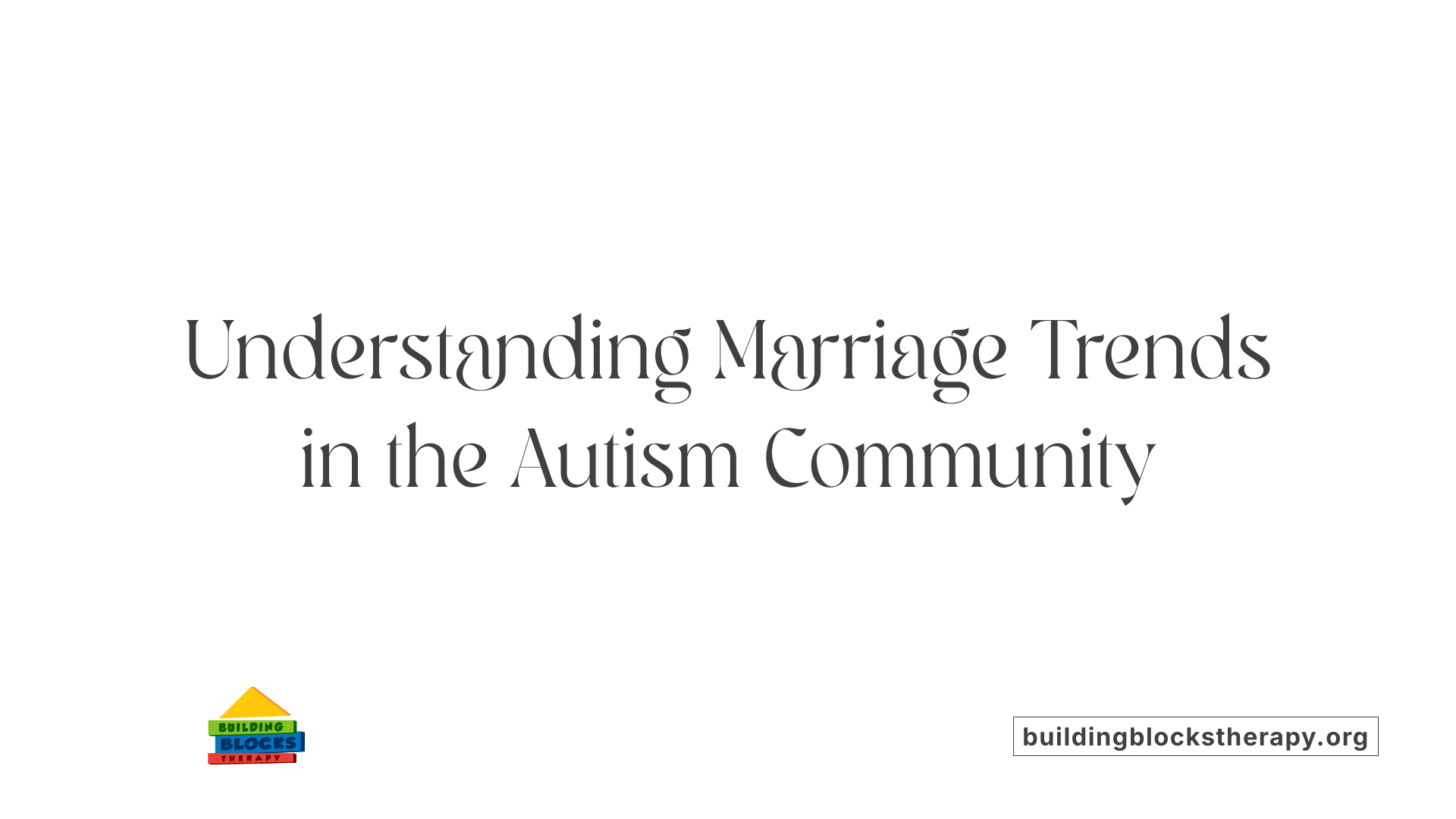
What is known about marriage rates among autistic adults?
Research suggests that a small percentage of autistic adults are married, with estimates between 5% and 9%. In the United States, about 9% of adults with autism are married. Typically, autistic individuals tend to marry later in life compared to neurotypical peers, who have a marriage rate of around 50%. Factors such as partner responsiveness, which influences relationship satisfaction by about 23%, and access to support like therapy or education, play important roles in enabling successful relationships.
How does autism affect the likelihood of marriage compared to the general population?
Autistic adults are about half as likely to marry as neurotypical individuals. While approximately 50% of neurotypical adults are married, only 5-9% of autistic adults are married. Autistic women are slightly more likely to marry than autistic men, with 16% of women on the spectrum being married compared to 11% of men. This lower marriage rate is influenced by challenges such as social integration issues, communication difficulties, and societal barriers that can make forming and maintaining romantic relationships more complex.
Age and Gender Differences in Marriage Prevalence
| Age Group | Percentage of Married Autistic Individuals | Gender Differences | Additional Notes |
|---|---|---|---|
| 20s | 9% | Women: 16%, Men: 11% | Autistic adults in their 20s are less likely to be married compared to the neurotypical population. |
| 30s | Higher than in 20s but still low | Similar trend, with women slightly more married | As age increases, marriage rates among autistic adults remain significantly lower than neurotypical peers. |
| General Population | Around 50% | Women tend to marry more than men | The disparity highlights social and relational challenges faced by autistic adults. |
Understanding these demographics shows that autism influences marriage likelihood, but it does not preclude forming lasting partnerships. With support, individuals on the spectrum can find meaningful relationships and experience marriage at various life stages.
Can Autistic Individuals Form Romantic and Marital Relationships?
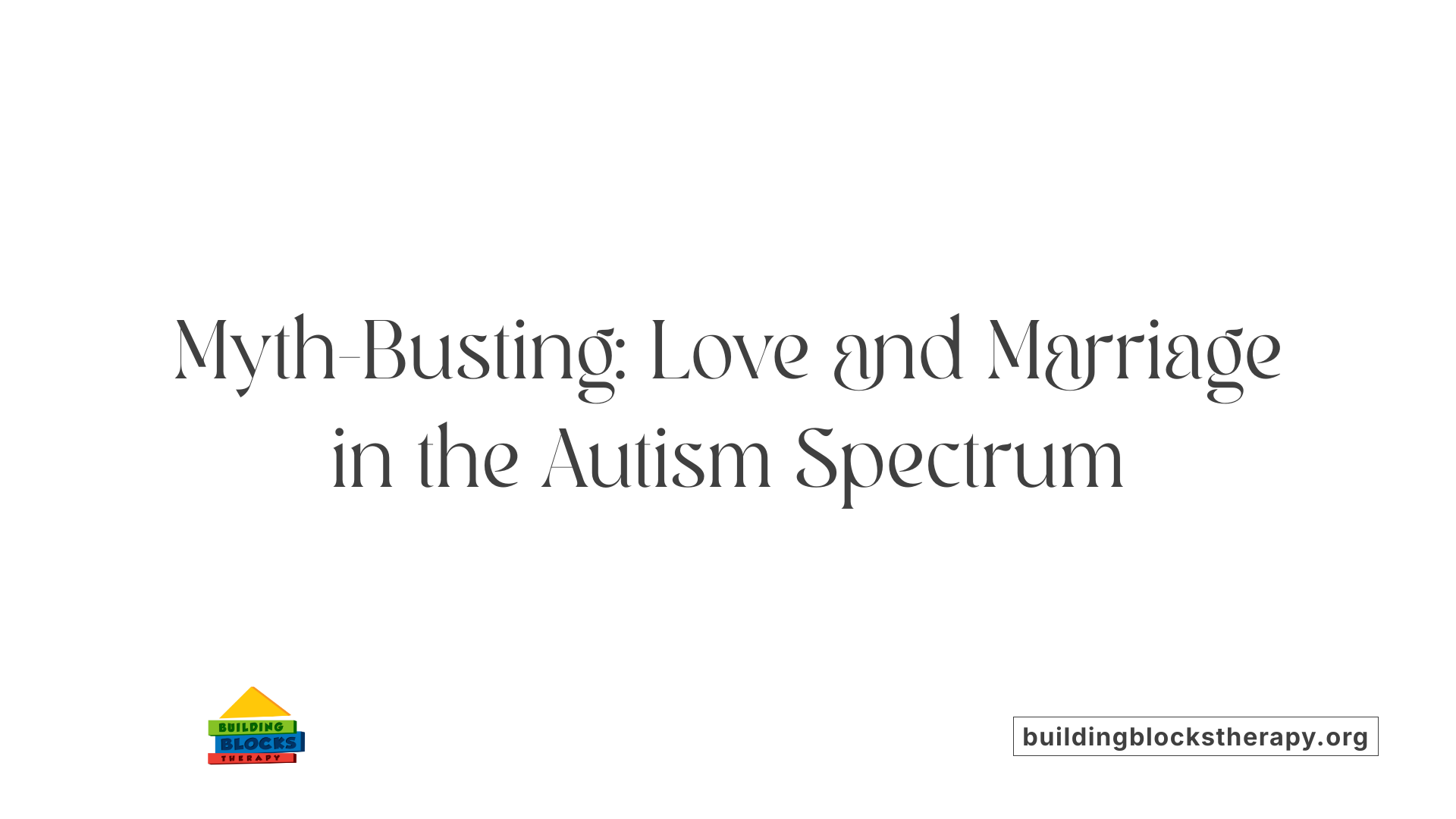
Are autistic individuals capable of forming romantic and marital relationships?
Autistic people are fully able to love and establish romantic and marriage relationships. Contrary to outdated stereotypes, many individuals on the spectrum experience strong emotions, attachment, and commitment. Personal accounts, such as those from Cassie Hauschildt, affirm that autism does not limit a person’s capacity for love.
Stories from real life, like that of Angel and Rekha, a couple both diagnosed with autism, demonstrate successful long-term partnerships. Angel, diagnosed after age four, and Rekha, diagnosed later, have been happily married since 2017. Their relationship shows that with understanding, patience, and support, autistic individuals can build deep, meaningful bonds.
While autism can bring challenges, such as sensory sensitivities or communication hurdles, these can be managed effectively. Partners often learn to accommodate each other's needs, making love and marriage possible regardless of an autism diagnosis.
What are some personal stories illustrating successful marriages involving autistic people?
Angel’s story is a shining example. Married for three years to Rekha, he has developed a strong emotional connection with her. He is employed at a hotel in New Delhi, supported by organizations like Action for Autism, illustrating that autistic adults can lead independent, fulfilling lives.
Their marriage adds to the evidence that autism does not prevent forming lasting romantic relationships. With mutual care and acceptance, couples on the spectrum can enjoy stability and happiness, breaking down stereotypes about emotional incapacity.
Additional Insights
Many autistic adults express a high desire for romantic relationships—around 75%—but only about half have had such experiences. Challenges like communication difficulties (experienced by around 67% of mixed-spectrum couples) can be mitigated through honesty, patience, and tailored support systems.
Understanding autism’s diversity is essential—some individuals on the spectrum find it easier to connect romantically, especially those with milder or higher-functioning autism. Overall, love and marriage are well within reach for many autistic individuals, showcasing the profound human capacity for emotional connection beyond neurotypical expectations.
Challenges and Benefits of Marital Life for Autistic Couples
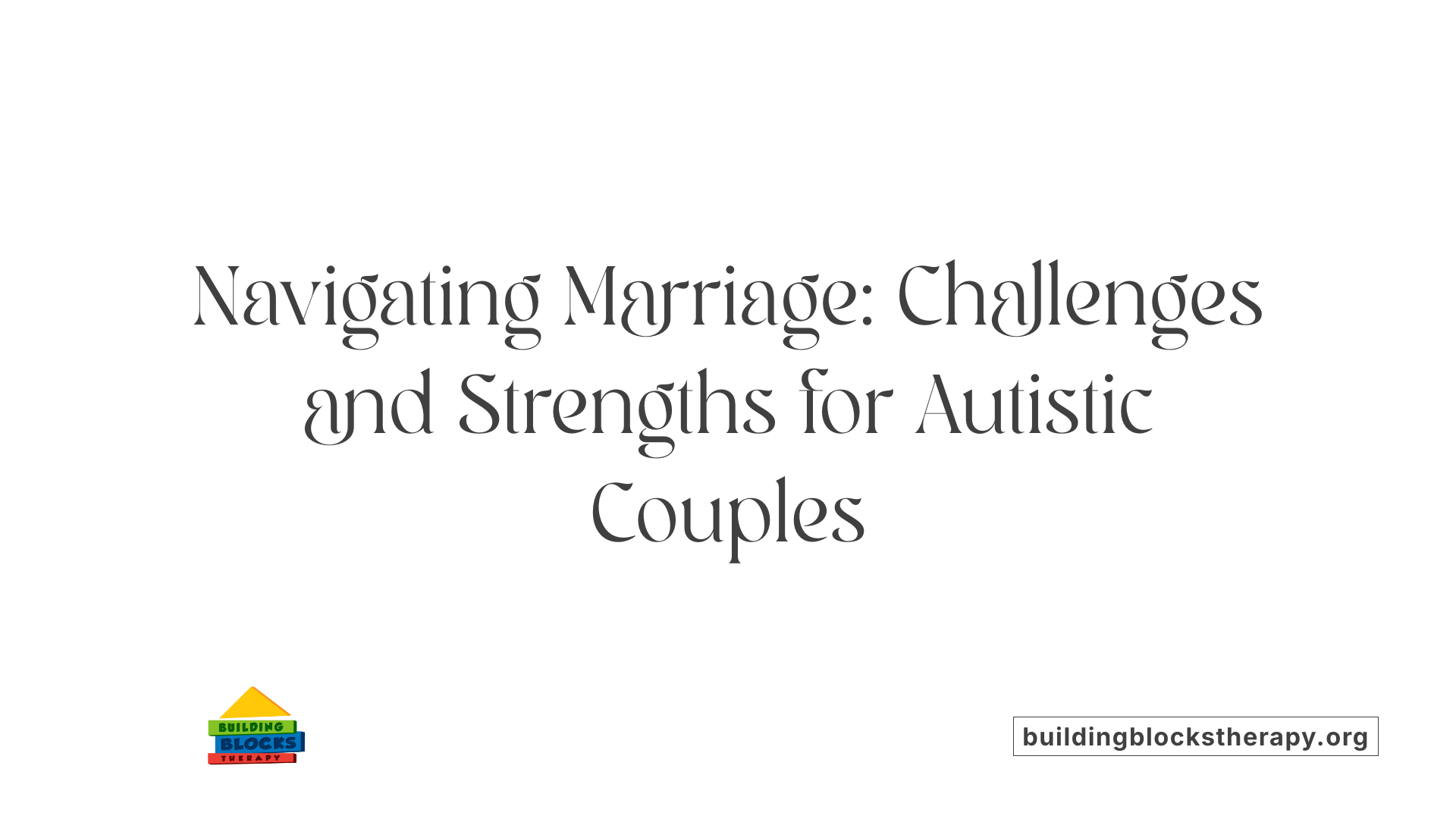
What challenges and benefits do autistic individuals experience in marriage?
Autistic individuals often face specific challenges and benefits in their marital relationships. Challenges include difficulties in interpreting non-verbal cues, managing social and emotional expectations, and adjusting to the routines that are common in marriage. Sensory sensitivities may also impact physical intimacy and daily interactions, making certain situations uncomfortable or stressful.
Despite these hurdles, many autistic couples find meaningful and fulfilling relationships. The advantages often stem from their honesty, clear communication, shared routines, and strong mutual understanding. These elements can create a stable foundation, allowing couples to develop deep bonds. With appropriate support and acceptance from both partners, autistic individuals can build marriages that emphasize their unique strengths and emotional capacities.
How do routines and predictability impact marriage for autistic individuals?
Marriage tends to be particularly suitable for autistic individuals because of its structured nature. The routine and predictability associated with married life can provide a sense of stability and security. Knowing what to expect each day helps reduce anxiety, fosters trust, and creates a comfortable environment for emotional sharing.
Structured daily life supports better adjustment and helps manage sensory sensitivities or behaviors that might otherwise cause stress. For many on the spectrum, these predictable patterns are not just comforting but also essential for maintaining the relationship's harmony.
Emotional Capacity, Empathy, and Love in Autism
Do autistic individuals feel love differently?
Autistic people are fully capable of experiencing love, much like neurotypical individuals. While their ways of expressing love may differ—sometimes through actions like supporting a partner, sharing interests, or practical gestures—they genuinely feel affection and emotional bonds. Personal stories, such as that of Cassie Hauschildt and Angel, who married Rekha, demonstrate that romantic love and deep connection are very much part of the autistic experience. These relationships often flourish with understanding, communication, and acceptance.
Autistic individuals may have routines, obsessions, or sensory sensitivities that influence how they relate emotionally. Though they may process and show emotions differently, this does not diminish their ability to love or be loved. These differences highlight the importance of mutual support and adaptability in relationships involving autistic partners.
What does recent research reveal about autism and empathy?
Arguments about autism and empathy have evolved significantly. Earlier stereotypes suggested that autistic individuals lacked empathy, but recent research paints a different picture. Studies now indicate that many autistic people experience empathy at levels comparable to, or even higher than, neurotypical individuals.
In fact, some autistic persons display over-empathy, feeling others' emotions intensely. This depth of understanding contributes positively to relationships, fostering trust and emotional intimacy. While challenges such as difficulty reading facial expressions or making eye contact can sometimes pose obstacles, they do not negate the capacity for genuine emotional connection.
Expressions of love and affection
Expressions of love among autistic individuals can vary, reflecting their unique personalities and communication styles. Some may verbalize their feelings directly, while others may show their love through actions, shared routines, or acts of support. The emphasis on routines and predictability, which many autistic people appreciate, can actually strengthen their relationships.
Open communication, acceptance, and patience are vital to nurturing these bonds. Partners who recognize and accommodate sensory sensitivities and other differences often find fulfilling, long-lasting relationships. Celebrating these differences enriches love stories within the autism community, confirming that love is universal.
| Aspect | Typical Expression | Autism Spectrum Illustration | Additional Notes | |----------------------------|-------------------------------------------|----------------------------------------|----------------------------------------------------------------| | Emotional Experience | Verbal expressions of love, hugs, kisses | Actions, routines, practical support | Emotions are real and deeply felt; display may differ | | Empathy Levels | Understanding and sharing feelings | Equal or higher empathy, over-empathy | Deep emotional understanding can be present despite stereotypes | | Communication of Affection | Saying |
Legal, Societal, and Emotional Aspects of Marriage for Autistic People
What legal challenges or protections exist regarding marriage and autism?
Autistic individuals have the right to marry legally, just like anyone else. However, there are some hurdles related to benefits and social safety nets. For instance, marriage can impact eligibility for specific disability benefits such as Supplemental Security Income (SSI). Many autistic adults, especially those with disabilities, might lose a portion of their benefits—up to 25%—if they marry someone without a disability and with a steady income.
Despite these challenges, legislative efforts are underway to protect the rights of autistic people. Bills have been introduced in the U.S. Congress to ensure that marriage does not automatically lead to the loss of vital benefits. Legislation aims to acknowledge the right to marry without risking financial instability. Still, societal biases and misconceptions often persist, leading to unequal treatment and a lack of understanding about the legal and personal autonomy of autistic individuals.
How do societal perceptions influence marriage for autistic people?
Society’s views on autism significantly shape perceptions of marriage and romantic relationships. Common stereotypes include the misconception that autistic people cannot love, feel emotions, or maintain meaningful relationships. These myths can negatively influence societal acceptance, leading to limited opportunities and support for autistic individuals seeking love or marriage.
Many autistic adults and their families advocate for greater awareness around the fact that autism exists on a spectrum, with individual abilities and desires varying widely. Promoting correct information and dispelling stereotypes encourage social acceptance, which is crucial for supporting autistic people's right to love and form companionships. Understanding and acceptance from society not only help autistic individuals find fulfilling relationships but also foster environments where their relationships are respected and valued.
| Aspect | Description | Impact |
|---|---|---|
| Legal Rights | Right to marry, potential benefit loss | Need for protective legislation |
| Social Perceptions | Stereotypes about autism and love | Influence on acceptance and support |
Despite societal challenges, many autistic individuals live fulfilling married lives, often with support, understanding, and honest communication. Recognizing their emotional capacity and respecting their personal choices are essential steps toward a more inclusive society.
Age, Gender, and Cultural Factors in Marital Trends
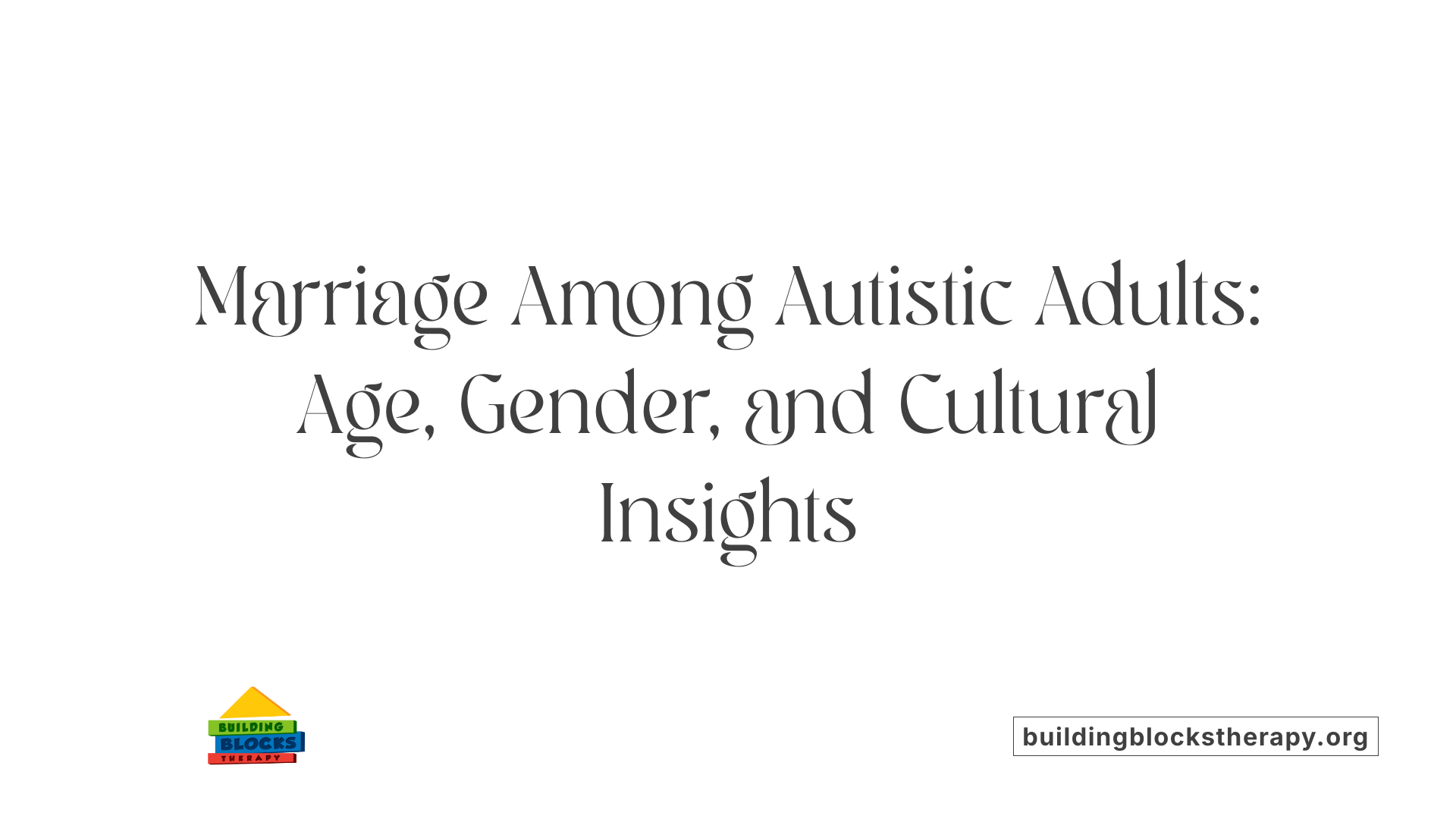
What is the typical age for marriage among autistic individuals?
The average age for marriage among autistic individuals is approximately 20 years old. However, this can vary widely depending on personal circumstances and cultural influences. Many autistic adults tend to marry later than their neurotypical peers, often due to social, developmental, or support-related factors. Access to resources, societal acceptance, and individual readiness play significant roles in determining when an autistic person might choose to marry.
Are there gender differences in marriage rates among autistic individuals?
There are notable gender differences in marriage rates within the autistic community. Data indicates that autistic women are more likely to be married than autistic men. Specifically, about 16% of autistic women are married, compared to roughly 11% of autistic men. These disparities could be driven by social expectations, differences in socialization, or available support systems. Autistic women may also be more inclined or supported to pursue partnerships, contributing to higher marriage rates.
Cultural variations and social acceptance
Cultural norms and societal acceptance significantly influence marriage trends among autistic people. In some cultures, marriage is highly valued and directly linked to social status, which can motivate autistic individuals and their families to seek partnerships despite challenges. Conversely, in regions where disability and autism are stigmatized, autistic adults may face additional barriers to marriage or prefer alternative forms of companionship.
Understanding these factors helps paint a comprehensive picture of how autism intersects with age, gender, and societal views on marriage. Despite lower marriage rates compared to neurotypical populations, autistic adults do marry, finding fulfillment and companionship through support, understanding, and acceptance.
Fulfilling Life Beyond Marriage: Autonomy and Support
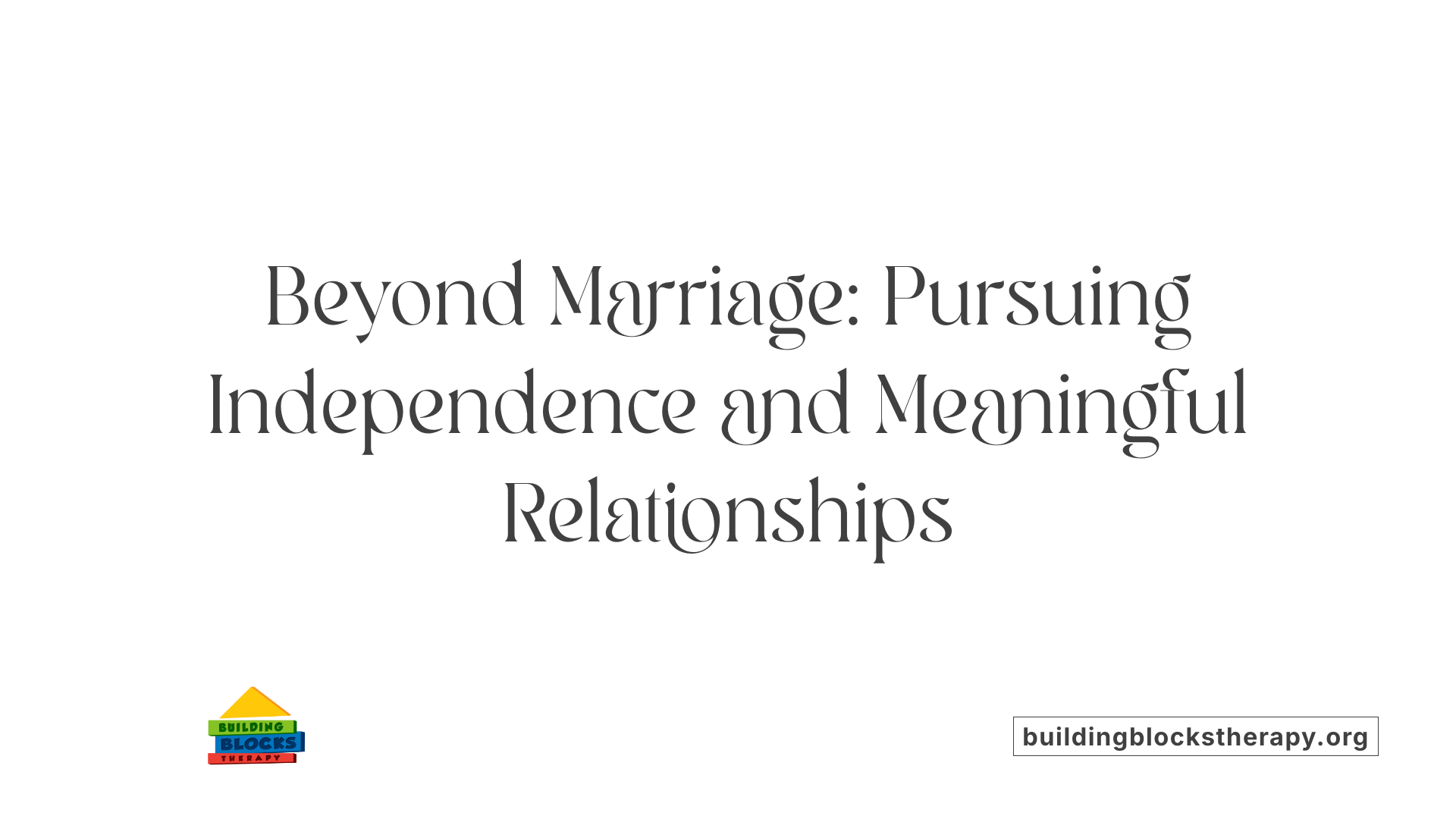
Can autistic individuals live independently and still pursue relationships?
Many autistic adults successfully live on their own while maintaining active romantic relationships. Autonomy and independence are possible through access to community resources, support services, and understanding environments. These supports help autistic individuals navigate daily life, foster social connections, and nurture love.
Living independently allows individuals with autism to establish routines that work for them, creating stability and comfort. Privacy and personal space are essential for mental well-being. With the right support networks, such as authorized caregivers or community groups, transition to independence becomes achievable.
Having a supportive community also plays a vital role. It provides emotional backing, advice, and safe spaces for social interaction. These elements enable many autistic adults to thrive romantically, highlighting that love and independence are not mutually exclusive.
What alternatives do autistic individuals opt for besides legal marriage?
Some choose to celebrate love or commitment without pursuing formal marriage. These alternative arrangements often reflect personal preferences, financial considerations, or societal influences.
Opting for ceremonies of love, such as commitment parties or symbolic rituals, allows autistic individuals to express their bond meaningfully. This approach helps avoid potential financial penalties like loss of benefits or social judgment, which can sometimes accompany legal marriage.
These celebrations serve as powerful symbols of partnership, emphasizing emotional connection over legal status. They foster a sense of belonging and affirmation, reinforcing that love can be recognized and celebrated in numerous ways.
Overview of Independent Living and Alternative Relationships in Autism
| Aspect | Description | Additional Notes |
|---|---|---|
| Autonomy | Many autistic adults live independently with support | Supports include social services, community programs, and caregiving networks |
| Romantic Pursuits | Love and relationships are very much possible | Emotional capacity often larger than stereotypes suggest |
| Alternative Celebrations | Love expressed through ceremonies without legal marriage | Focus on emotional bonds, symbolic importance, privacy |
| Benefits | Increases individual happiness and social integration | Enhances well-being and societal participation |
| Challenges | Social and sensory difficulties can complicate relationships | Supportive environments mitigate these issues |
Exploring autonomy and alternative forms of commitment highlights that love and independence are accessible for many on the autism spectrum, fostering fulfilling and meaningful lives.
Celebrating Love and Diversity in Autism
Autistic individuals are fully capable of love, commitment, and creating meaningful partnerships. Though challenges exist, they can be addressed through understanding, support, and acceptance. Society's perceptions are evolving, and with ongoing efforts, the vision of fulfilled, inclusive relationships for autistic people continues to grow. Marriage, whether legal or symbolic, remains a powerful expression of connection and mutual support for those on the autism spectrum.
References
- Autism and marriage
- I'm married. I'm also autistic. But being on the spectrum ...
- Marriage Proposal Carries Consequences
- 15+ Autism Marriage Statistics and Facts - Crown Counseling
- Autism, Love and Marriage: Can a Person with Autism be in a ...
- Mummy, When Will I Get Married?
- Do Autistic People Get Married?






